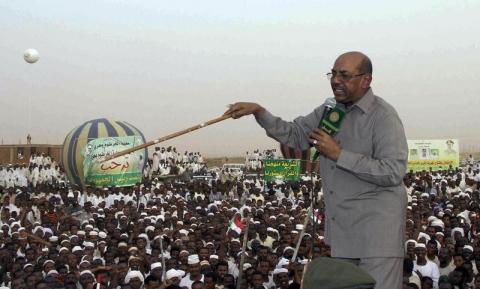Advertisement
Sudan's Bashir chosen by his ruling party as sole candidate for 2015 elections
KHARTOUM (Reuters) - Sudan's ruling party chose President Omar Hassan al-Bashiron Tuesday as its candidate for next year's presidential vote, making it almost certain that he will not step aside but extend his rule after 25 years in power.
The 70-year-old Bashir, wanted on charges of genocide and war crimes by the International Criminal Court, had previously indicated he would not run for another term in elections scheduled for April 2015.
He had also pledged to hold a national dialogue before the vote but the few active opposition movements in Sudan seem to have already lost hope of any change in the political climate.
One of the main opposition parties, the Popular Congress Party, announced last week it would boycott the elections, saying they would not be credible because of a lack of democracy.
In another case, senior opposition figure Sadiq al-Mahdi left Sudan for Cairo this year after a short stay in jail, having been arrested on charges that could have led to the death penalty.
With no clear challengers from outside the party, the National Congress Party's executive council quickly narrowed down its potential candidates from five to one, signaling that Bashir had no intention of ceding power.
The other candidates were Bashir's top aides, including Lieutenant General Bakri Hassan Saleh, who replaced veteran politician Ali Osman Taha as Bashir's top deputy last year.
On Tuesday, the majority of council members cast their lot with Bashir. Ibrahim Ghandour, vice president of the party, told Reuters that only Bashir's name would be put forward for a final approval vote at a party conference starting on Thursday.
ICC WORRIES
Since taking power in a 1989 coup, the autocrat has weathered rebellions and civil war. His biggest concern now is an ICC arrest warrant on charges that he orchestrated atrocities during the conflict in the strife-torn western region of Darfur.
He dismisses these charges and Sudan refuses to deal with the Hague-based court. The warrant prevents Bashir from traveling to many countries, although he has been welcomed in some allied countries such as Egypt and Saudi Arabia.
Magdi El Gizouli, a researcher with the Rift Valley Institute, said Bashir's fear of being prosecuted at the ICC and mistrust even of his closest aides and senior party officials prevents him from stepping down.
"President Bashir's candidacy was almost guaranteed ... He can't afford to be anything but president. He has to die in office. There is no other realistic option for him," Gizouli said.
Bashir attended the council meeting on Tuesday along with the other candidates but was the only one among them to speak. In brief remarks, he told the meeting that he would give a speech at Thursday's conference.
"WE WANT A NEW LIFE"
Among the participants in Tuesday's meeting was one who left angrily, muttering to journalists outside that Bashir's nomination "defeats the idea of renewing the party, which needs new faces and new leaders".
This statement will ring true with at least some Sudanese, who are struggling in difficult economic circumstances including inflation that has hovered at 40 percent for months.
The secession of the oil-rich south in 2011 sparked an economic crisis so severe that it led to protests which the government put down by force.
A 24-year-old university graduate who gave his name as Ahmed and said he was unemployed reflected on the candidacy announcement, saying that Bashir had ruled Sudan since before he was born.
"Enough, we need change, we need a new president because it's not possible that throughout my life, I've seen nothing but Bashir," he said.
"We want a president that provides employment and education for young people. We want to work and get married. We want a new life."
(Additional reporting and writing by Maggie Fick; Editing by Raissa Kasolowsky)



















Add new comment